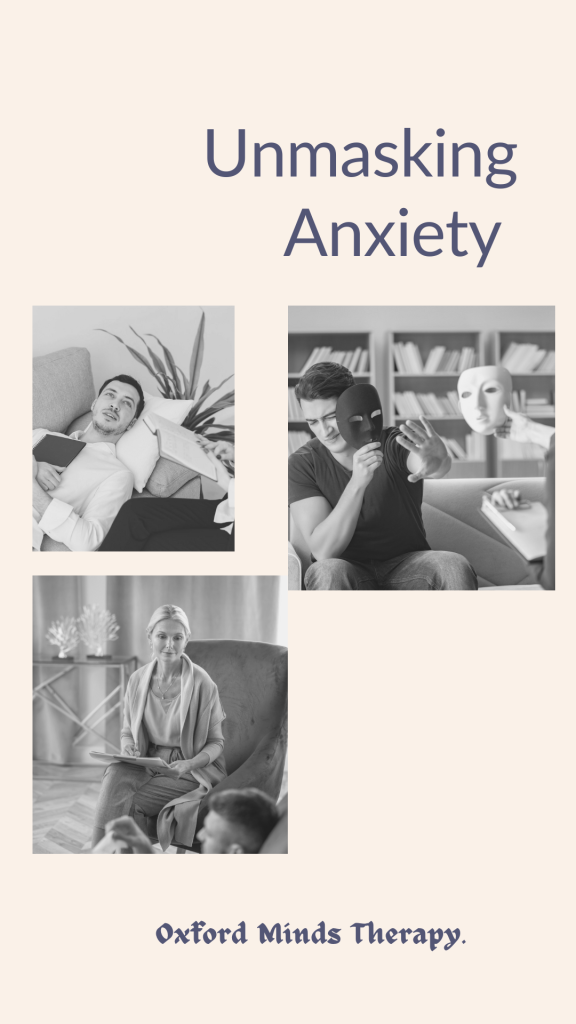Anxiety is a common yet complex emotional state that affects millions of people worldwide. It is a natural response to stress and perceived danger. Fundamentally, anxiety is a survival mechanism that prepares your body to respond to threats and can manifest in various forms, from fleeting moments of worry to persistent, overwhelming fear. However, when anxiety becomes chronic or disproportionate to the situation, it can lead to physical and emotional exhaustion which disrupts daily life and well-being. If you are in this undesirable state, there is hope with Oxford Minds Therapy where we apply Neuro-linguistic programming (NLP) techniques and Hypnotherapy to overcome this problem.
Book your Discovery Call here or contact me for a Quick Chat!
The Nature of Anxiety
Anxiety is a broad term that encompasses various disorders, each with its unique features and challenges. Understanding the underlying causes is the first step in addressing and managing your anxiety effectively at Oxford Minds Therapy. Anxiety manifests in various forms, including:
Generalised Anxiety Disorder (GAD) GAD is characterised by excessive, uncontrollable worry about everyday things. Individuals with GAD often anticipate disaster and may be overly concerned about health, money, family, work, or other issues.
- Panic Disorder : panic disorder involves sudden, intense bouts of fear or discomfort known as panic attacks. These attacks are often accompanied by physical symptoms such as heart palpitations, shortness of breath, dizziness, and abdominal distress.
- Social Anxiety Disorder : social anxiety disorder, or social phobia, is an intense fear of being judged, negatively evaluated, or rejected in social or performance situations. This can lead to avoidance of social interactions and significant distress.

Specific Phobias : a specific phobia is an intense, irrational fear of a particular object or situation, such as heights, flying, or certain animals. These fears can lead to avoidance behaviours that interfere with daily life.
- Obsessive-Compulsive Disorder (OCD) : OCD is characterised by unwanted and intrusive thoughts (obsessions) and repetitive behaviours or mental acts (compulsions) that individuals feel driven to perform in response to the obsessions.
- Post-Traumatic Stress Disorder (PTSD) : PTSD can develop after exposure to a traumatic event. Symptoms include flashbacks, nightmares, severe anxiety, and uncontrollable thoughts about the event.
Each type has unique characteristics, but all share a common theme: an exaggerated response to perceived threats or discomfort.
The Impact of Anxiety
Anxiety can affect your mind and body in profound ways. It can lead to a range of physical symptoms, including headaches, muscle tension, fatigue, and digestive issues. Chronic anxiety can also weaken your immune system, making you more susceptible to illnesses. Mentally, anxiety can cloud judgment, impair concentration, erode self-confidence and self-esteem making it challenging to focus on tasks or make decisions. It often leads to cognitive distortions, where you perceive situations as more threatening than they are. Anxiety can affect your thinking patterns, leading to negative and irrational thoughts. This negative thinking pattern can perpetuate the cycle of worry and fear, making it difficult to break free – this is where Oxford Minds Therapy steps in. With anxiety, you may avoid situations you perceive as threatening, limiting your experiences and opportunities for growth whilst reinforcing feelings of inadequacy and helplessness, perpetuating the cycle of anxiety.
By Victoria N Waligo
https://oxfordmindstherapy.pbnlp.org/
Book your Discovery Call here or contact me for a Quick Chat!
Phone: +447826 966828
WhatsApp: +447826 966828
Email: Victoria@PeopleBuilding.co.uk
